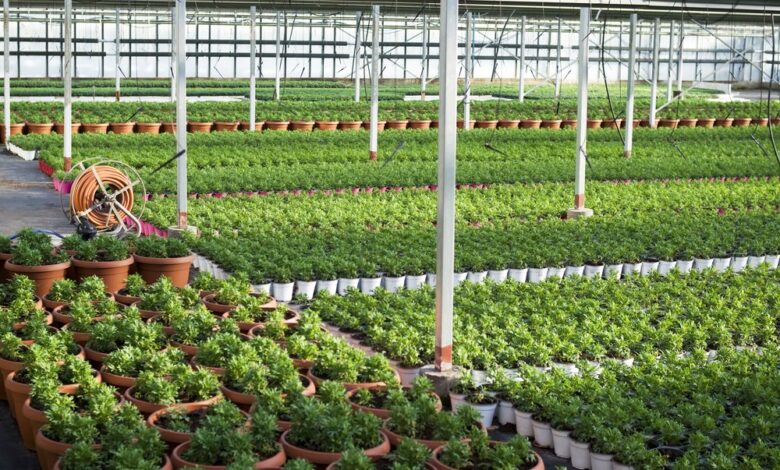The Benefits of Plant Nurseries webfreen.com

Plant nurseries play a crucial role in the cultivation and distribution of healthy plants, ensuring that gardening enthusiasts, landscapers, and farmers receive high-quality plants suited for various environments. The benefits of plant nurseries webfreen.com extend beyond just providing plants; they contribute to environmental conservation, economic growth, and urban beautification. This article delves into the numerous advantages of plant nurseries, shedding light on their importance in today’s world.
The Role of Plant Nurseries in Sustainable Gardening
Plant nurseries are essential for promoting sustainable gardening practices. They help in growing and maintaining different plant species, ensuring that gardeners and landscapers have access to quality plants. Here’s how nurseries contribute to sustainability:
1. High-Quality Plant Cultivation
Nurseries provide controlled environments where plants receive proper care, nutrients, and water. This leads to stronger plants that are more resistant to diseases and pests.
2. Conservation of Rare and Endangered Species
Many plant nurseries specialize in growing rare and endangered plant species, helping to preserve biodiversity and prevent the extinction of valuable plants.
3. Efficient Use of Resources
Modern plant nurseries implement water-saving techniques such as drip irrigation and hydroponics, reducing water wastage and promoting sustainable farming.
4. Reduction of Deforestation
By providing a steady supply of plants, nurseries reduce the need for deforestation, encouraging afforestation and reforestation initiatives.
The Economic Benefits of Plant Nurseries webfreen.com
Plant nurseries contribute significantly to local and global economies by creating employment opportunities and boosting the agricultural sector.
1. Job Creation and Employment
Nurseries employ a large workforce, including horticulturists, botanists, and laborers, providing job opportunities for people in urban and rural areas.
2. Boost to Agricultural and Horticultural Industries
Farmers and gardeners depend on nurseries for high-quality seedlings, which improve crop yield and increase agricultural productivity.
3. Contribution to the Landscaping Industry
Landscapers rely on nurseries to source a variety of plants for parks, gardens, and urban spaces, enhancing real estate value and beautification.
4. Income Generation for Small-Scale Growers
Small-scale nursery owners benefit from selling plants, flowers, and ornamental species, providing them with a sustainable source of income.
Environmental Benefits of Plant Nurseries webfreen.com
One of the most significant contributions of plant nurseries is their positive impact on the environment. They play a crucial role in improving air quality, preventing soil erosion, and supporting ecological balance.
1. Air Purification and Carbon Sequestration
Plants grown in nurseries help absorb carbon dioxide, releasing oxygen and improving air quality, which is essential for human health.
2. Prevention of Soil Erosion
Nurseries cultivate plants with strong root systems that help in binding soil particles together, preventing soil erosion and promoting land stability.
3. Wildlife Habitat Preservation
Plant nurseries contribute to creating green spaces that serve as habitats for birds, insects, and other wildlife, supporting biodiversity.
4. Climate Change Mitigation
Through afforestation and reforestation efforts, nurseries play a key role in combating climate change by reducing greenhouse gas emissions.
The Benefits of Using Nursery-Grown Plants
Plants grown in nurseries offer several advantages over those sourced from the wild or grown in non-controlled environments.
1. Healthy and Disease-Free Plants
Nursery-grown plants receive proper care, including pest control and fertilization, resulting in healthier plants with higher survival rates.
2. Diverse Selection of Plants
Nurseries offer a wide variety of plants, including ornamental, medicinal, fruit-bearing, and native species, catering to different customer needs.
3. Year-Round Availability
Unlike wild plants that follow seasonal growth patterns, nursery plants are available throughout the year, making them convenient for gardeners.
4. Customization and Pre-Order Options
Many nurseries offer customized plant orders, allowing customers to choose specific varieties and sizes for their landscaping projects.
The Role of Plant Nurseries in Urban Greening
Urban areas benefit greatly from plant nurseries, as they provide plants that help enhance city landscapes, promote mental well-being, and reduce pollution.
1. Enhancing Urban Aesthetics
Nurseries supply flowering plants, shrubs, and trees that improve the visual appeal of cities and towns.
2. Reduction of Urban Heat Island Effect
Green spaces created with nursery plants help cool urban areas by providing shade and reducing heat absorption from concrete structures.
3. Mental and Physical Health Benefits
Studies have shown that greenery in urban areas reduces stress, promotes relaxation, and encourages outdoor activities, improving overall well-being.
4. Air Pollution Reduction
Trees and plants grown in urban nurseries help filter pollutants, improving air quality and reducing respiratory illnesses.
How to Choose a Reliable Plant Nursery
Selecting a good nursery is essential for obtaining healthy plants. Here are some factors to consider when choosing a plant nursery:
1. Reputation and Reviews
Look for nurseries with positive customer reviews and a good reputation for providing quality plants.
2. Plant Health and Quality
Inspect plants for signs of disease, pests, and overall health before making a purchase.
3. Variety and Availability
Choose a nursery that offers a wide selection of plants to suit your gardening or landscaping needs.
4. Knowledgeable Staff and Customer Support
A good nursery should have experienced staff who can provide advice on plant care, maintenance, and selection.
Importance of Plant Nurseries in Environmental Education
Plant nurseries play a significant role in educating communities about the environment, biodiversity, and the importance of green spaces. They act as learning centers for both children and adults, promoting awareness of ecological issues.
1. Workshops and Training Programs
Many plant nurseries offer workshops on topics such as plant care, organic gardening, and composting. These programs help people learn practical skills while fostering a love for nature.
2. School Collaborations
Nurseries often collaborate with schools to organize educational trips where children can learn about different plant species, their growth cycles, and the importance of trees in the environment.
3. Community Gardening Initiatives
Some nurseries partner with local communities to set up community gardens, promoting collective efforts in growing plants and preserving green spaces.
4. Raising Awareness About Native Plants
Nurseries educate people about the importance of native plants in supporting local wildlife and reducing water consumption, helping to preserve regional ecosystems.
How Plant Nurseries Support Organic Farming
Plant nurseries are vital for promoting organic farming, which benefits both human health and the environment. They provide organic seedlings and natural fertilizers, helping farmers adopt sustainable practices.
1. Organic Seedlings Supply
Many nurseries specialize in organic seedlings that are free from chemical treatments, giving farmers a healthy starting point for their crops.
2. Compost and Natural Fertilizers
Plant nurseries often sell compost, vermicompost, and organic fertilizers that improve soil health without harming the environment.
3. Pest Control Solutions
Nurseries offer natural pest control solutions such as neem oil and beneficial insects like ladybugs, reducing the need for chemical pesticides.
4. Promoting Crop Rotation Techniques
They advise farmers on crop rotation practices, which prevent soil depletion and improve yield naturally.
Technological Innovations in Plant Nurseries
With advancements in technology, plant nurseries have adopted modern techniques to enhance plant growth and sustainability. These innovations make nurseries more efficient and eco-friendly.
1. Automated Irrigation Systems
Modern nurseries use automated drip irrigation systems that deliver water directly to plant roots, reducing water waste.
2. Hydroponic and Aeroponic Systems
Some nurseries grow plants without soil using hydroponics and aeroponics, which require less water and space compared to traditional methods.
3. Greenhouse Technology
Advanced greenhouses with climate control systems help nurseries grow plants year-round, protecting them from extreme weather conditions.
4. Digital Inventory Management
Nurseries use software to manage plant inventory, track growth cycles, and ensure timely delivery to customers.
Role of Plant Nurseries in Urban Forest Development
Urban forest development is essential for combating pollution and promoting greenery in cities. Plant nurseries play a crucial role in providing saplings and native trees for urban greening projects.
1. Tree Plantation Drives
Nurseries collaborate with local authorities and NGOs to supply trees for large-scale plantation drives in cities.
2. Vertical Gardens for Small Spaces
Many nurseries provide plants and equipment for creating vertical gardens, making greenery possible even in limited spaces.
3. Reviving Abandoned Lands
With the help of nurseries, abandoned or degraded lands can be transformed into green spaces through afforestation projects.
4. Stormwater Management Solutions
Plant nurseries promote the use of rain gardens and other landscaping methods to reduce flooding and manage stormwater runoff.
The Psychological Benefits of Visiting Plant Nurseries
Visiting plant nurseries has therapeutic effects on mental health, offering a calming environment where people can reconnect with nature.
1. Stress Relief and Relaxation
Walking through a nursery surrounded by greenery can reduce stress levels and promote relaxation.
2. Therapeutic Gardening Programs
Some nurseries organize therapeutic gardening sessions for people dealing with anxiety, depression, or physical disabilities.
3. Boosting Creativity and Focus
Choosing plants and planning gardens encourages creativity and helps improve focus, especially for children and seniors.
4. Social Interaction Opportunities
Nurseries provide a welcoming space where people can connect with fellow plant enthusiasts and exchange gardening tips.
Online Plant Nurseries and Their Growing Popularity
With the rise of e-commerce, many nurseries have transitioned to online platforms, making it easier for customers to purchase plants from the comfort of their homes.
1. Wide Range of Plants
Online plant nurseries offer a wider variety of plants than local stores, catering to different gardening needs.
2. Convenient Home Delivery
Customers can order plants and gardening supplies online, saving time and effort.
3. Expert Advice via Live Chat
Many online nurseries provide expert advice through live chat, helping customers choose the right plants and care tips.
4. Subscription Services for Regular Plant Deliveries
Some nurseries offer subscription boxes that deliver plants and gardening kits to customers every month.
How Plant Nurseries Help in Disaster Recovery
After natural disasters like floods, wildfires, or droughts, plant nurseries play a critical role in restoring vegetation and rebuilding ecosystems.
1. Supplying Native Plants for Reforestation
Nurseries provide native tree saplings that help restore damaged landscapes.
2. Soil Stabilization Projects
Plants with strong root systems are grown to stabilize soil and prevent further erosion in affected areas.
3. Reviving Wildlife Habitats
Nurseries supply plants that attract pollinators and small animals, helping restore ecological balance.
4. Community Involvement Programs
Nurseries organize tree-planting events where local communities can participate in disaster recovery efforts.
Contribution of Plant Nurseries to Climate Change Mitigation
Plant nurseries play a crucial role in combating climate change by promoting afforestation and providing plants that improve air quality. Their contribution helps reduce greenhouse gases and protect the environment.
1. Carbon Sequestration
Plants from nurseries absorb carbon dioxide from the atmosphere, helping to lower carbon levels and mitigate the effects of global warming. Nurseries supply a variety of trees and shrubs that actively contribute to carbon storage.
2. Air Pollution Control
Many nurseries focus on growing plants that improve air quality, such as Aloe Vera, Peace Lily, and Snake Plants. These plants help filter harmful toxins from the air, making urban areas healthier.
3. Temperature Regulation in Cities
Urban plant nurseries provide shade trees and green walls, which help regulate temperatures in cities by reducing the heat island effect.
4. Promoting Sustainable Practices
Nurseries promote eco-friendly practices like using biodegradable pots, rainwater harvesting, and natural fertilizers, reducing the overall carbon footprint.
How Plant Nurseries Promote Biodiversity Conservation
Plant nurseries contribute significantly to biodiversity conservation by cultivating native plants and preserving endangered species. This practice helps maintain ecological balance and protect various ecosystems.
1. Preservation of Native Plants
Nurseries often grow native plants that support local wildlife, including bees, butterflies, and birds. These plants play a key role in preserving biodiversity.
2. Propagation of Rare and Endangered Species
Specialized nurseries propagate rare and endangered plant species to prevent their extinction, helping protect genetic diversity.
3. Habitat Restoration Projects
Many nurseries collaborate with environmental organizations to provide plants for habitat restoration projects in degraded areas.
4. Pollinator-Friendly Plants
Nurseries promote the cultivation of flowering plants that attract pollinators like bees and butterflies, contributing to the overall health of ecosystems.
Role of Plant Nurseries in Promoting Sustainable Landscaping
Sustainable landscaping is essential for creating eco-friendly outdoor spaces, and plant nurseries play a key role in supplying suitable plants and materials.
1. Water-Efficient Plants
Nurseries offer drought-tolerant plants like succulents and native grasses that require less water, helping conserve resources.
2. Soil Improvement Solutions
They provide compost, organic fertilizers, and soil conditioners that improve soil health without harmful chemicals.
3. Eco-Friendly Mulch and Pots
Many nurseries sell biodegradable mulch and pots made from coconut coir or recycled materials, reducing plastic waste.
4. Design Consultation Services
Some nurseries offer landscape design consultations, helping customers create sustainable gardens that use minimal resources.
The Impact of Plant Nurseries on Local Economies
Plant nurseries play a vital role in boosting local economies by creating jobs, supporting small businesses, and promoting green industries.
1. Job Creation
Nurseries employ workers for various tasks like planting, packaging, sales, and delivery, providing employment opportunities in local communities.
2. Supporting Small Farmers
Many nurseries collaborate with local farmers by purchasing seeds, compost, and organic fertilizers, supporting small agricultural businesses.
3. Green Business Opportunities
Nurseries encourage entrepreneurship by supplying plants and materials for small-scale gardening businesses.
4. Boosting Tourism
Well-maintained nurseries with diverse plant collections attract visitors and nature enthusiasts, boosting eco-tourism.
Health Benefits of Growing Plants from Plant Nurseries
Growing plants at home not only enhances aesthetics but also provides numerous health benefits, and plant nurseries make it easier to start gardening.
1. Improved Air Quality
Plants like Spider Plants and Peace Lilies absorb toxins, purify the air, and improve indoor air quality.
2. Stress Reduction
Gardening is a proven stress-relief activity that promotes mental well-being and reduces anxiety.
3. Physical Activity
Tending to plants encourages physical activity, improving overall health and fitness.
4. Boosting Immunity
Exposure to soil and nature strengthens the immune system by increasing beneficial bacteria in the body.
Plant Nurseries and Water Conservation Efforts
Water scarcity is a growing global issue, and plant nurseries contribute to water conservation through smart gardening techniques and sustainable practices.
1. Drip Irrigation Systems
Nurseries use drip irrigation systems that deliver water directly to plant roots, minimizing wastage.
2. Drought-Resistant Plants
They promote plants like lavender, agave, and succulents that thrive with minimal water.
3. Rainwater Harvesting
Many nurseries install rainwater harvesting systems to irrigate plants sustainably.
4. Mulching Techniques
Nurseries provide mulch that retains moisture in the soil, reducing the frequency of watering.
The Future of Plant Nurseries and Their Growing Importance
With increasing awareness of climate change and environmental sustainability, plant nurseries are set to play an even bigger role in the future.
1. Technological Advancements in Plant Cultivation
New techniques such as hydroponics, aeroponics, and tissue culture are improving plant growth and sustainability.
2. Increased Demand for Organic and Medicinal Plants
As people become more health-conscious, there is a rising demand for organic and medicinal plants grown in nurseries.
3. Integration with Urban Farming
Nurseries are increasingly being integrated with urban farming initiatives, providing fresh produce to city dwellers.
4. Greater Emphasis on Native and Drought-Resistant Plants
With water scarcity concerns, nurseries are focusing on growing native and drought-resistant plants that require minimal maintenance.
Conclusion
The benefits of plant nurseries webfreen.com are extensive, ranging from economic and environmental contributions to improving urban landscapes and sustainable agriculture. By supporting nurseries, individuals and communities can contribute to a greener, healthier, and more sustainable future. Whether you are a gardener, landscaper, or environmental enthusiast, investing in plants from nurseries is a step toward a better planet.



